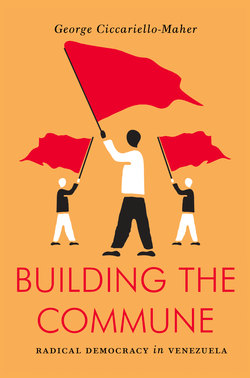Building the Commune

Реклама. ООО «ЛитРес», ИНН: 7719571260.
Оглавление
George Ciccariello-Maher. Building the Commune
Building the Commune. Radical Democracy in Venezuela
CONTENTS
INTRODUCTION
1. A HISTORY OF THE COMMUNE
2. THE BARRIOS AND THE STRUGGLE FOR URBAN SPACE
3. COUNTERREVOLUTION
4. MILITIAS AND REVOLUTIONARY COLLECTIVES
5. THE COMMUNE IN PROGRESS
6. CULTURE AND PRODUCTION
CONCLUSION: A COMMUNAL FUTURE?
NOTES
ACKNOWLEDGEMENTS
Отрывок из книги
The Jacobin series features short interrogations of politics, economics, and culture from a socialist perspective, as an avenue to radical political practice. The books offer critical analysis and engagement with the history and ideas of the Left in an accessible format.
The series is a collaboration between Verso Books and Jacobin magazine, which is published quarterly in print and online at jacobinmag.com.
.....
Social welfare came first, with the Bolivarian government attempting to tackle the poverty and social exclusion left by more than a decade of neoliberal reform. But even after being elected, the Chávez government lacked control over the purse strings of the national oil company, Petróleos de Venezuela, S.A. (PDVSA). As a result, the revolution would not truly get under way until the combative whirlwind that began with the brief coup against Chávez in April 2002. US-backed and -funded opposition forces briefly kidnapped the president and abolished the new Constitution before being forced out of power by mass mobilizations in the streets and the barracks alike. Defeated politically but not economically, opposition forces then shut down the entire Venezuelan oil industry in late 2002. They were again defeated, this time by oil workers who seized the installations after more than two catastrophic months.
With oil production now firmly in the hands of the state, the Bolivarian government sought to make good on its promises of social welfare, in particular through the establishment of a series of Bolivarian missions. Misión Barrio Adentro, for example, provided free health care in the poorest neighborhoods through Cuban-staffed medical clinics; a series of missions provided free education, from basic literacy training up to the university level; Misión Mercal provided subsidized food; Misión Vuelvan Caras (About-Face) sought to eradicate poverty by integrating the poorest of the poor—and these were followed by dozens more.
.....